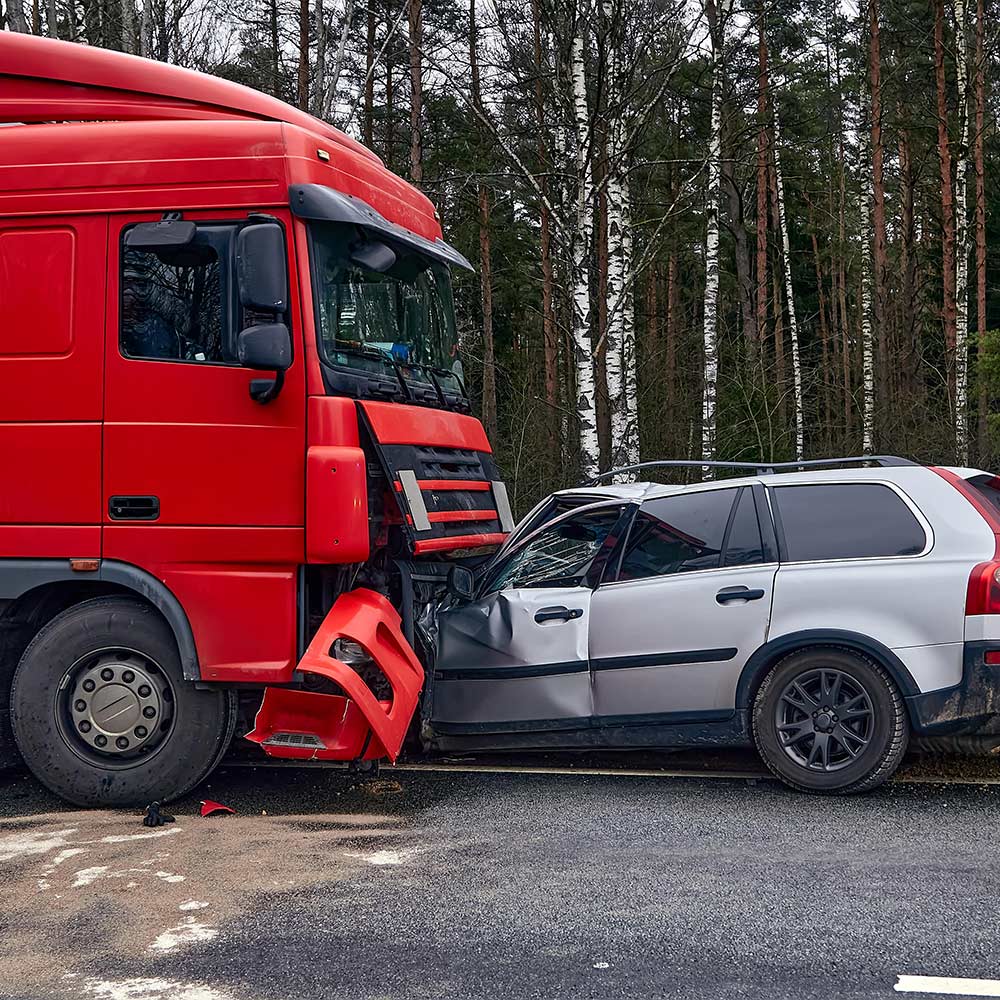
Truck Accidents
Our lawyers can help you get the money for your injuries quickly.Truck Accidents account for a significantly high number in California due to the vast network of highways, busy ports, and large commercial industries. These accidents often involve large commercial trucks such as tractor-trailers, big rigs, and delivery trucks.

How do Truck Accidents Happen?
Truck accidents can occur due to a variety of factors, and understanding these causes is essential to improve road safety. Some of the common causes of truck accidents include:
How Can Driver Error Cause a Major Truck Accident?
Driver Error: Most importantly, Truck drivers, like all motorists, can make mistakes while operating their vehicles. Secondly, these errors may include speeding, improper lane changes, failure to yield, and ignoring traffic signals.
Truck Accident: What Happens when a Truck Driver Falls Asleep at the Wheel?
Fatigue: For example, long hours on the road and demanding schedules can lead to driver fatigue. Additionally, drowsy driving can impair a truck driver’s reaction time and decision-making abilities, increasing the risk of accidents.
Because a driver was on the phone or not paying attention to the road, it can cause a Truck Accident?
Distracted Driving: Truck drivers can become distracted by various factors, such as using mobile phones, adjusting GPS devices, eating, or engaging in other activities that divert their attention from the road.
Can a professional truck driver get a DUI?
Impaired Driving: Driving under the influence of alcohol, drugs, or certain medications can significantly impair a truck driver’s ability to operate their vehicle safely.
Road Safety: Causes for a Truck Accident You didn’t know could be a cause!
Inadequate Training: Proper training is crucial for truck drivers to handle the complexities of operating large commercial vehicles. Inexperienced drivers may struggle with maneuvering, braking, or responding to emergency situations.
Equipment Failure: Mechanical failures, such as brake malfunctions, tire blowouts, or steering issues, can lead to loss of control over the truck and cause accidents.
Improper Loading: Incorrectly loaded cargo can affect the truck’s stability and handling, leading to rollovers or load spills, which can result in accidents on the road.
Other Causes: What if the driver is not at fault for a Truck Accident?
Adverse Weather Conditions: Inclement weather, such as heavy rain, snow, ice, or fog, can reduce visibility and create hazardous road conditions, making truck accidents more likely.
Poor Road Conditions: Potholes, uneven surfaces, and poorly maintained roads can be challenging for truck drivers to navigate safely.
Can a Truck Driver Legally Cut Into My Lane?
Aggressive Driving: Aggressive behaviors like excessive speeding, sudden lane changes, or road rage can escalate situations and contribute to accidents.
Blind Spots: Large trucks have significant blind spots around their vehicles, limiting the truck driver’s ability to see other vehicles, especially cars directly alongside or behind the truck.
Tailgating: Following too closely to other vehicles, particularly at high speeds, can lead to rear-end collisions if the truck driver doesn’t have enough time to react to sudden stops.
Determining Liability: Who’s Fault is it if there is a Truck Accident?
Determining liability in a personal injury lawsuit involving a truck can be complex due to the involvement of various parties and factors. The process involves investigating the accident thoroughly and considering relevant laws and regulations.
What are the key steps and factors used to determine liability?
Accident Investigation: A comprehensive investigation of the accident scene is crucial. This includes gathering evidence, taking photographs, obtaining surveillance footage (if available), and talking to witnesses. The investigation aims to reconstruct the sequence of events leading up to the accident.
Police Reports: The police report filed at the scene of the accident can provide valuable information about the circumstances and the initial assessment of fault.
Driver Negligence: If the truck driver’s negligence is a significant factor in the accident, they may be held liable. Negligence can include violations of traffic laws, distracted driving, impaired driving, speeding, or failing to yield the right-of-way.
Additional Factors That Can Contribute to the Fault and Cause of a Truck Accident.
Employer Liability: For example, in many cases, the trucking company that employs the driver may also share liability. Additionally, under the legal doctrine of “respondent superior,” employers are often held responsible for the actions of their employees while they are performing their job duties.
Third-Party Liability: Liability may extend to third parties, such as the truck manufacturer or maintenance companies, if equipment failure or inadequate maintenance played a role in the accident.
What if a Truck Driver doesn’t follow regulations?
Trucking Regulations: The trucking industry is subject to various federal and state regulations. Violations of these regulations, such as hours-of-service violations, inadequate driver training, or improperly secured cargo, can establish liability.
Comparative Negligence: Some states follow the principle of comparative negligence, where each party’s degree of fault is assessed. Moreover, if the injured party is found partially at fault for the accident, their compensation may be reduced proportionately.
Expert Witnesses: In complex cases, expert witnesses, such as accident reconstruction experts or medical professionals, may be called upon to provide insights and opinions regarding liability and the extent of injuries.
Did you know Trucks have a black box just like an airplane?
Black Box Data: Many commercial trucks are equipped with electronic control modules (ECMs), also known as “black boxes,” which record valuable data about the truck’s operation before and during the accident.
Settlement Negotiations: Often, liability is determined during settlement negotiations between the involved parties and their insurance companies.
Who’s at fault for a Truck Accident?
Moreover, determining liability in a truck accident requires a thorough examination of the evidence and a comprehensive understanding of the applicable laws and regulations. For instance, it’s essential to consult with an experienced personal injury attorney who can navigate the legal complexities and build a strong case on your behalf.
Remember, each personal injury case is unique, and the process may vary depending on the specifics of your situation. Consulting with VBV Law Group will provide you with the most accurate and relevant advice for your specific case.



